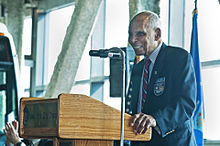Roscoe Brown
| Roscoe Brown | |
|---|---|

Brown speaks at the dedication of the Tuskeege Airmen Bus Depot of MTA Regional Bus.
|
|
| Born |
March 9, 1922 Washington, D.C. |
| Died | July 2, 2016 (aged 94) Norwood, New York |
| Allegiance | United States |
| Service/branch | Army Air Corps |
| Rank | Captain |
| Unit | 100th Fighter Squadron of the 332nd Fighter Group |
| Conflict | World War II |
| Awards | Distinguished Flying Cross |
Roscoe Conkling Brown Jr. (March 9, 1922 – July 2, 2016) was one of the Tuskegee Airmen and a squadron commander of the 100th Fighter Squadron of the 332nd Fighter Group. He graduated from the Tuskegee Flight School on March 12, 1944 as member of class 44-C-SE and served in the U.S. Army Air Forces in Europe during World War II. During this period, Captain Brown shot down an advanced German Me-262 jet fighter and a FW-190 fighter. He was awarded the Distinguished Flying Cross. Brown was born in Washington, D.C. in 1922. His father, Roscoe C. Brown, Sr. (1884–1963), was a dentist and an official in the United States Public Health Service who was born as George Brown and had changed his name to honor Roscoe Conkling, a strong supporter of the rights of African Americans during Reconstruction. His mother was the former Vivian Berry, a teacher.
Prior to his wartime service, he graduated from Springfield College, Springfield, Massachusetts, where he was valedictorian of the Class of 1943.
After the war, Captain Brown resumed his education. His doctoral dissertation was on exercise physiology and he became a professor at New York University and directed their Institute of Afro-American Affairs. He was President of Bronx Community College from 1977 to 1993 and then director for the Center for Education Policy at the City University of New York. In 1992, Brown received an honorary doctor of humanics degree from his alma mater, Springfield College.
...
Wikipedia
